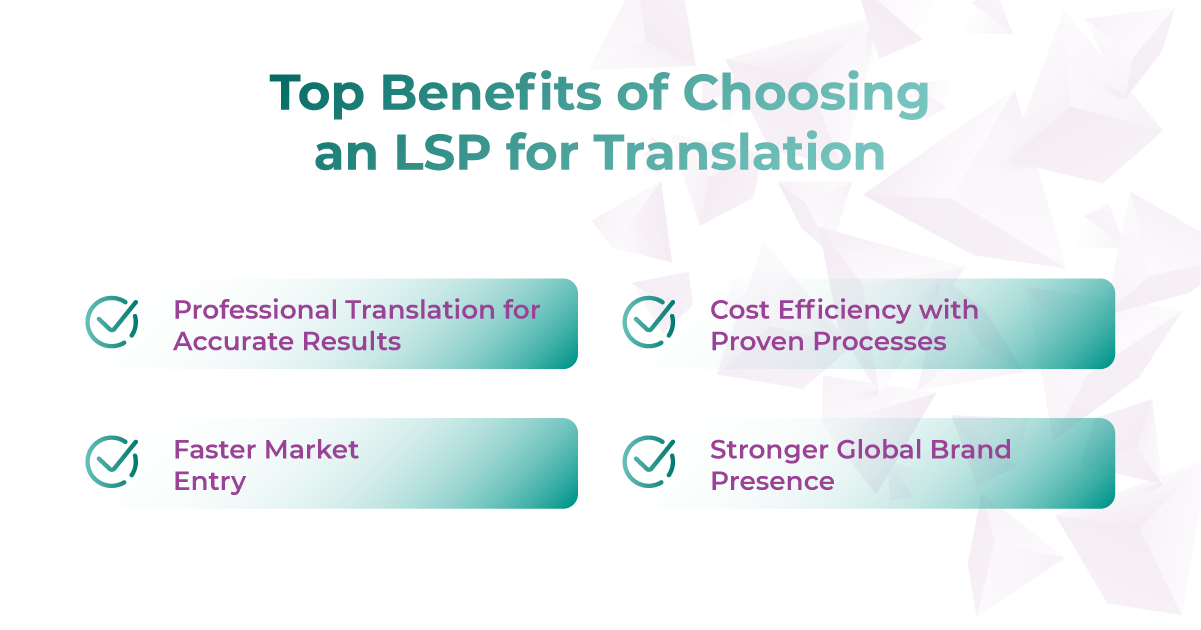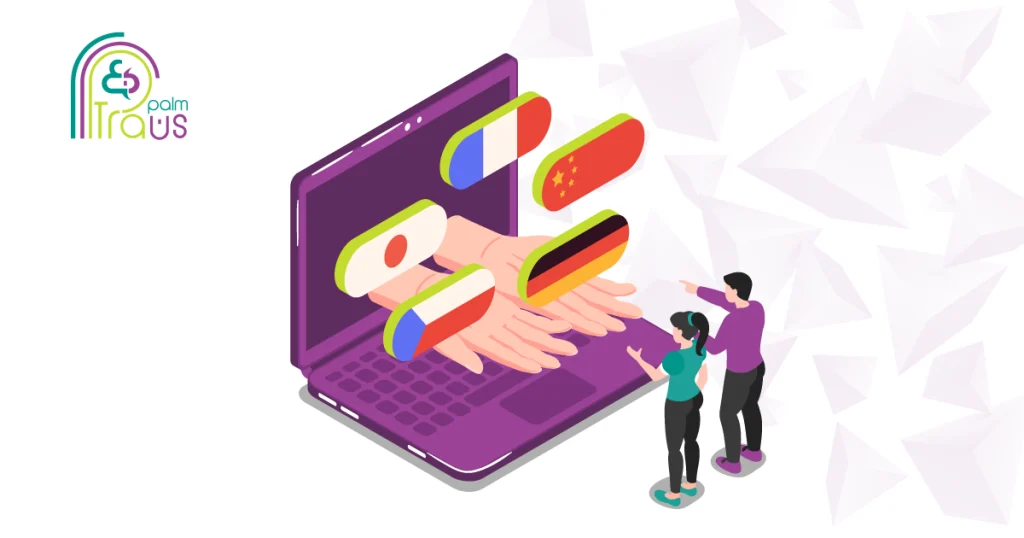If entering international markets is part of your strategy, now’s the perfect time to consider a professional language service provider (LSP). Translating content into multiple languages requires language skills, resources, or time to manage the hectic workload all of which many businesses may not have in-house.
Projects that involve full localization also need the right language service provider to align content with the cultural and linguistic nuances of each region.
In this guide, you will learn what language service providers do, why businesses need them, the different types of LSPs, the advantages they can bring to your business, and what to keep in mind when choosing a language service provider to help you find your feet in global markets.
Enjoy Reading!
Primary Reasons Why You Should Work with an LSP
You might be wondering why your business should entrust translation tasks to an LSP. The truth is, their services are valuable for all businesses, regardless of size or industry.
Any company aiming to reach international markets can benefit from working with a reliable language service provider. They specialize in tailoring messages and products to suit diverse linguistic and cultural audiences.
As the custodians of clear communication, language service providers effectively eliminate language barriers, enabling global businesses to accurately connect with clients and partners.
Exploring LSP Types: Which One Suits Your Translation Project?
A language service provider empowers a wide range of industries, to expand and succeed in the global market. However, it’s important to recognize that not all translation agencies deliver the same set of language solutions or operate the same way.
Every type of LSP has its structure and focus areas, which can mainly impact the outcome of your translation project.
Most language service providers focus on certain sectors and tasks, accompanied by solutions related to quality assurance of the same.
Single Language Providers (SLP)
Some companies specialize in translation solutions for one specific language or a regional family of languages. They often target a single foreign market, having deep knowledge of local dialects, customs, and cultural references.
SLPs are typically smaller providers known for their customer-centric approach to projects. For example, you could find some companies that focus solely on Scandinavian languages, while others may specialize in Romance languages.
Multiple Language Providers (MLP)
Many LSPs manage large-scale translation projects that cater to businesses seeking translations in multiple languages.
They have the resources to handle even the most complex projects, which include a team of expert linguists, project managers, and advanced translation tools.
If a client requires marketing materials translated into several languages, an MLP oversees the entire project under one roof to save time and guarantee consistent messaging across all markets.
Want to expand your global reach? Discover our professional translation services for seamless multilingual solutions.
Specialized Translation Solutions
Some language service providers tend to specialize in specific domains that demand subject matter expertise and a high level of accuracy.
- Legal translation for contracts and compliance documents.
- Medical translation for healthcare communication and research papers.
- Technical translation for product manuals and technical guides.
- Financial translation for financial statements, reports, and audits.
Language Interpreter Services
Some language agencies cater solely to interpreting services, providing highly trained interpreters equipped for conferences, business meetings, political delegations, hospital settings, courtrooms, and other real-time communication scenarios that need oral translation.
Interpretation Type | Description |
Consecutive | One person speaks in their language, and the interpreter translates into the target language. |
Simultaneous | A translator sits in a sound booth and translates speeches in real-time for delegates via headphones. |
On the phone | Remote settings rely on phone interpretation to enable instant communication between speakers of different languages. |
Software and Website Localization
Adapting websites and software for global users takes specialized skills. Some LSPs focus on this niche, handling localization engineering and testing to deliver a smooth multilingual experience for their clients.
These companies are highly IT-intensive, with dedicated IT and development groups working alongside the translation team to manage the technical complexities of the process.
MultiMedia Localization LSP
Some language service providers specialize solely in adapting creative content such as video dubbing, voice-over, subtitling, print media, advertising, and social media to reach different markets, helping your message resonate across cultures.
Key Tips to Follow When Choosing the Right Language Service Provider
Before you even go hunting for your perfect partner, you need to lay down the criteria and the actual requirements for your translation project.
1- What expertise should LSP translators possess?
Ensure that your LSP has subject matter expertise in your line of work. Translators must have a solid grasp of industry-specific terminology, regional cultural nuances, branding standards, and linguistic proficiency to deliver quality translations.
2- Which languages do you cover, and what markets do you target?
Determine whether you are serving a single foreign market or multiple ones. If you plan to go global, your selected LSP should offer a wide range of language options and be capable of handling your required volume to support diverse communication needs.
3- Do they have any case studies or testimonials similar to the project?
You’ll want to choose someone with proven years of experience working with clients in your industry. If possible, ask for evidence of past works.
4- What language technologies are used in the process?
Evaluate whether the language service provider is familiar with new industrial developments and invests in technology that’s top of the line for more efficient and smarter processes. Some important translation tools of today include:
✔ Machine translation
✔ Translation memory
✔ Translation management systems
✔ Glossary database
✔ CAT tools
✔ Quality assurance tools
5- How do you guarantee accuracy and consistency in translations?
We advise you to collaborate with a translation company that has ISO certification and follows the highest quality standards.
6- What quality control processes do you have in place?
An LSP that implements measurable QA processes to support linguists in delivering accurate, high-quality translations.
Advantages of Outsourcing Your Translation Projects to an LSP
Professional Translation for Accurate Results
Gain access to expert linguists who deliver precise, culturally relevant content tailored to your audience.
Cost Efficiency with Proven Processes
Reduce the risk of costly errors by relying on skilled translators and structured workflows.
Faster Market Entry
An experienced LSP streamlines processes, helping your business expand into new markets more efficiently.
Stronger Global Brand Presence
Culturally adapted content enhances customer trust and strengthens your brand’s reputation worldwide.

Machine Translation vs. Human Translation
Aspect | Machine Translation (MT) | Human Translation |
Role | Automates translation using algorithms and language models. | Relies on human skills to align translations with cultural norms. |
Benefits | Fast, cost-effective, and handles large volumes. | High accuracy, culturally relevant, and deals with complex terminology. |
Limitations | May produce errors, lacks cultural awareness, and struggles with technical terms. | Slower and may cost more. |
Best Use Cases | Repetitive tasks, quick drafts, and large texts. | Creative content and complex translations that require a high level of accuracy. |
TransPalm: Your Perfect Language Service Provider
Choosing the right LSP requires careful consideration of subject matter expertise, project management capabilities, and strict quality assurance practices.
TransPalm brings all these qualities together to deliver quality translations. We pride ourselves on being true partners for our clients, proactively suggesting professional translation solutions that keep them achieving their goals.
Get a Free Quote Today or check out our translation and localization services to learn how TransPalm can help you confidently expand into international markets and achieve sustainable growth.





